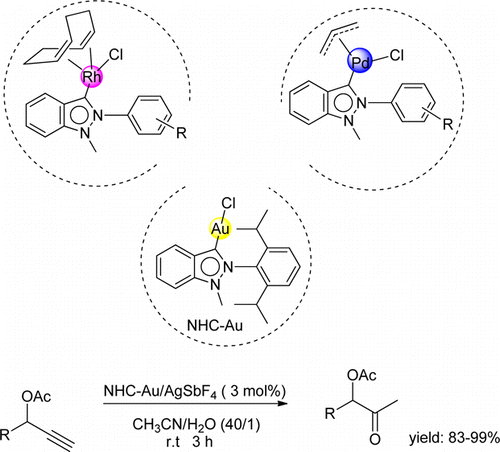Indazolin‑s‑ylidene−N-Heterocyclic Carbene Complexes of Rhodium, Palladium, and Gold
(June 22th, 2013, reported by Yang Zhou)
Since N-heterocyclic carbenes (NHCs) were first isolated in the free state by Arduengo and co-workers in 1991, NHCs have been studied extensively as ligands in organometallic chemistry and in catalysis. Owing to their strong σ-donation and the excellent stability of NHCs complexes toward air and moisture, N-heterocyclic carbenes often could promote higher catalytic activity than phosphane ligands. Huynh and co-worker pioneered the design and synthesis of indazolin-s-ylidene (Indy) carbenes in 2009, which has only one carbon in the NHC skeleton, showed even stronger donating capacities than the classical NHC ligands. However, examples of Indy-NHC complexes and catalytic activities of these Indy-NHC complexes are still rather limited.
By introducing an aryl group with different substituents on the central nitrogen atom of the Indy-NHCs, our group design and synthesis of a novel series of Indy-NHC complexes which allow modifications at the coordinated Indy-N-heterocyclic carbene ligands. We have also investigated the catalytic activity of NHC-Au complex, and the results have been demonstrated that the gold Indy-NHC complex show superior catalytic activities in the hydration of alkynes reaction (80-99%). This work has very nice contribution to the existing area of abnormal carbene chemistry, and is as soon as publishable in Organometallics.

